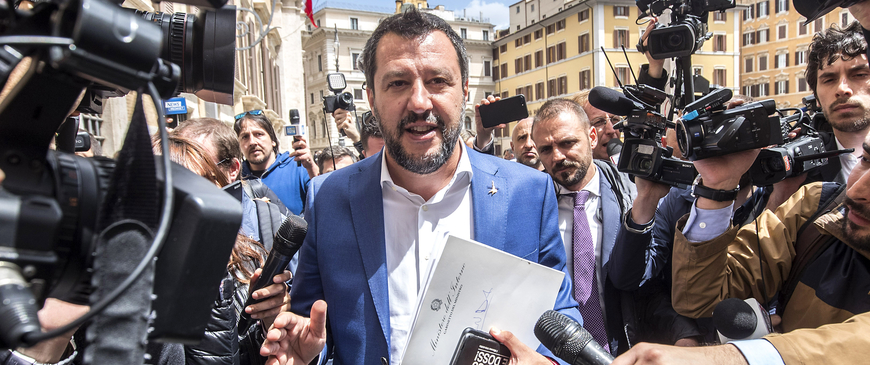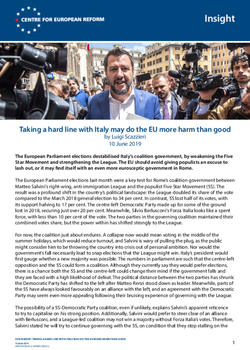
Taking a hard line with Italy may do the EU more harm than good
The European Parliament elections destabilised Italy’s coalition government, by weakening the Five Star Movement and strengthening the League. The EU should avoid giving populists an excuse to lash out, or it may find itself with an even more eurosceptic government in Rome.
The European Parliament elections last month were a key test for Rome’s coalition government between Matteo Salvini’s right-wing, anti-immigration League and the populist Five Star Movement (5S). The result was a profound shift in the country’s political landscape: the League doubled its share of the vote compared to the March 2018 general election to 34 per cent. In contrast, 5S lost half of its votes, with its support halving to 17 per cent. The centre-left Democratic Party made up for some of the ground lost in 2018, securing just over 20 per cent. Meanwhile, Silvio Berlusconi’s Forza Italia looks like a spent force, with less than 10 per cent of the vote. The two parties in the governing coalition maintained their combined votes share, but the power within has shifted strongly to the League.
For now, the coalition just about endures. A collapse now would mean voting in the middle of the summer holidays.
For now, the coalition just about endures. A collapse now would mean voting in the middle of the summer holidays, which would reduce turnout, and Salvini is wary of pulling the plug, as the public might consider him to be throwing the country into crisis out of personal ambition. Nor would the government’s fall necessarily lead to snap elections that the League might win. Italy’s president would first gauge whether a new majority was possible. The numbers in parliament are such that the centre-left opposition and the 5S could form a coalition. Although they currently say they would prefer elections, there is a chance both the 5S and the centre-left could change their mind if the government falls and they are faced with a high likelihood of defeat. The political distance between the two parties has shrunk: the Democratic Party has shifted to the left after Matteo Renzi stood down as leader. Meanwhile, parts of the 5S have always looked favourably on an alliance with the left, and an agreement with the Democratic Party may seem even more appealing following their bruising experience of governing with the League.
The possibility of a 5S-Democratic Party coalition, even if unlikely, explains Salvini’s apparent reticence to try to capitalise on his strong position. Additionally, Salvini would prefer to steer clear of an alliance with Berlusconi, and a League-led coalition may not win a majority without Forza Italia’s votes. Therefore, Salvini stated he will try to continue governing with the 5S, on condition that they stop stalling on the League’s key priorities: the so-called flat-tax, greater autonomy for certain northern Italian regions and the construction of the Lyon-Turin high-speed railway. If the 5S agrees to the League’s demands, Salvini will be able to secure victories while further weakening his coalition partner. On the other hand, if the 5S refuse to agree to his policies, Salvini would be able to end the coalition, avoiding the accusation that he brought down the government out of personal ambition.
The 5S is torn: if it continues to govern, it will risk losing further support. But if it breaks the coalition, it would probably have to face early elections, in which it would face heavy losses. Additionally, most of 5S’s prominent lawmakers, including leader and deputy prime minister, Luigi Di Maio, would be unable to stand again, as the party imposes a two-term limit on its representatives.
Italy finds itself politically isolated, in a fragile economic condition and in the middle of a new struggle over its budgetary plans with the European Commission.
At the same time, Italy finds itself politically isolated, in a fragile economic condition and in the middle of a new struggle over its budgetary plans with the European Commission. The outgoing Commission has just issued its report recommending an ‘excessive deficit procedure’ (EDP). In December last year, Rome narrowly avoided an EDP, after the government watered down and deferred its expensive electoral promises of tax cuts and spending increases. For its part, the Commission accepted Rome’s widely optimistic forecast of 1.5 per cent growth in 2019.
However, the deal proved short lived, as the Italian economy has slowed together with the European economy and is projected to grow at just 0.1 per cent of GDP in 2019. Moreover, the costs of servicing Italy’s public debt have increased as markets are losing confidence in the Italian government. As a result, the Commission predicts that the budget deficit for this year will increase to 2.5 per cent of GDP, and public debt to 133.7 per cent. This has put Italy in serious breach of its debt reduction target. Moreover, Italy’s finances are set to worsen further in 2020. With current policies, the Commission sees the budget deficit rising to 3.5 per cent, with debt rising to 135 per cent of GDP.
It is now up to member-states to decide whether to follow the Commission’s recommendation to open the EDP against Italy. The procedure has several phases, but could eventually result in a fine of up to 0.2 per cent of GDP. The EU has tried to avoid giving Rome an excuse to lash out, with economy Commissioner Pierre Moscovici saying that he was open to further discussions. But Rome is unlikely to back down: while economics minister Giovanni Tria has sought to reassure the EU that Rome is planning a programme of spending cuts and revenue boosting measures, Salvini has repeated calls for a ‘fiscal shock’ and for Italy to ignore the eurozone’s 3 per cent budget deficit limit.
The Commission’s criticism of Italy presents a golden opportunity for Italian eurosceptics to rail against ‘Brussels’.
The Commission’s criticism of Italy presents a golden opportunity for Italian eurosceptics to rail against ‘Brussels’. Salvini and the 5S will exploit the complicated and poorly understood nature of the EU’s fiscal rules to argue that the Commission has singled out Italy for criticism, and that France (which is set to run a deficit above 3 per cent in 2019) has been able to avoid the procedure. The EU’s patchy insistence on adherence to rules plays into the populists’ argument that Italy’s fiscal policy is constrained by Brussels – rather than being largely the result of Italy’s own economic weakness.
The launch of an EDP may embolden Salvini to precipitate the breakup of the coalition, avoiding the need to draw up a budget with the 5S, and further benefitting from eurosceptic sentiment. The 5S would then have to form a coalition with the Democratic Party and bear responsibility for putting together the 2020 budget, or face losses in new elections. In an election campaign, an EDP would make it harder for pro-Europeans to argue their case. If the European Parliament election results were replicated in a new general election, the outcome would be a right-wing coalition made up by the League and the smaller right-wing nationalist Brothers of Italy, possibly including Berlusconi’s Forza Italia. A coalition between the 5S and the Democratic Party is far less likely, as it would be very difficult for the two to agree to a formal pre-electoral alliance – improving the League and its allies’ chances of victory.
At the same time, an EDP will probably fail to force Italy to alter its spending plans. The Commission seeks an annual fiscal retrenchment of 0.6 per cent of GDP until the structural deficit is in balance. While no Italian government would be willing to commit to, or be able to implement such fiscal tightening given the current political climate and Italy’s economic weakness, any government will be constrained by market pressure anyway. Last year, the rising cost of financing Italy’s debt drove the League and the 5S to water down their electoral promises. The markets would react in a similar way to a splurge in next year’s budget, which should prevent any government from going too far. The priority of any government in the 2020 budget will be finding resources to offset (at least in part) €23 billion of highly unpopular VAT increases, legislated in the 2019 budget. The current government may be the most constrained of any possible coalition in its ability to raise revenue or cut spending: the League opposes higher taxes, while the 5S do not want to roll back the party’s flagship policy, a ‘citizens’ income’ which provides higher welfare payments for poor people, and which was launched in March. A Five Star - Democratic Party coalition could have more leeway to raise revenue, perhaps through higher taxes on high earners.
A right-wing coalition led by the League would take a more confrontational stance towards the EU than the current government.
A right-wing coalition led by the League would take a more confrontational stance towards the EU than the current government over migration and foreign policy, and would seek to pick more fights with France. But it would probably be more fiscally conservative than the current government. It is easy to overestimate pressure for fiscal expansion within the League’s electorate, whose main concerns are migration, and law and order issues. Salvini’s proposal for a ‘flat tax’ should not be taken literally, but rather as a provocation, and a symbol for lowering taxes. It would be quite possible for Salvini to claim victory with minimal moves and vague plans to bring down higher rates in following years. Moreover, the League would cut – or eliminate – 5S’s citizen’s income. A more concerning development is the League’s support for ‘mini-Bots’, a form of scrip currency that, if introduced, risks fuelling the perception that Italy is preparing to exit the euro. While Parliament has instructed the government to look into the idea, the plan remains embryonic, and pressure on the League to back off from markets and business constituencies within its own electorate will rise if the plan comes anywhere near fruition.
The pressure from markets means the EU can approach the EDP with pragmatism. It should not simply give in to populists, of course. But instead of trying to push Italy towards a fiscal retrenchment of a magnitude which would be politically difficult for any government, and could be economically damaging, a more promising route would be for the Commission to steer Rome’s spending away from welfare increases and income tax cuts, towards measures that are likelier to boost growth, for example investment in education, one of Italy’s key weakness. This could offer Rome an exit from the corner the government has moved itself into.
If the dispute escalates, Italy may suffer from market turmoil. But the EU would also lose out: eurosceptic sentiment in Italy (and possibly across the EU) would be strengthened, Italy could descend into a serious economic crisis and the fiscal rules would be further discredited as a tool to maintain stability in the eurozone.
Luigi Scazzieri is a research fellow at the Centre for European Reform.


Add new comment